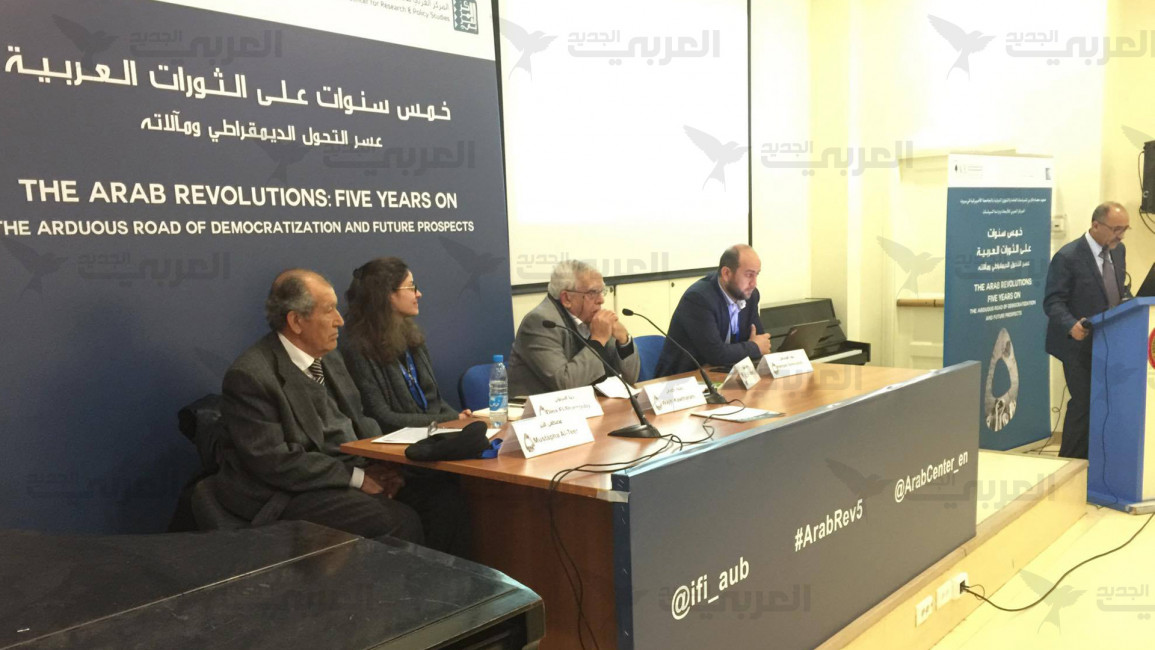Beirut conference offers 'a quiet review' of Arab Spring
Beirut conference offers 'a quiet review' of Arab Spring
Leading Arab think-tanks the Arab Centre for Research and Policy Studies and the Issam Fares Institute convene to dissect Arab revolutions, now held back by military juntas and radical jihadism.
2 min read
The conference brings together leading analysts to learn the lessons of the Arab Spring [TNA]
The Arduous Road of Democratisation and Future Prospects, a three-day conference organised by the AUB's Issam Fares Institute for Public Policy and International Affairs (IFI) and the Arab Center for Research and Policy Studies (ACRPS), kick-started its sessions in the Lebanese capital, Beirut, on Thursday.
The conference has gathered a large number of Arab and international scholars and intellectuals to look over and learn the lessons of the breathtaking events that have swept the Arab region, particularly the countries that saw massive protests and some open rebellions as part of the so-called Arab Spring.
"It has become extremely crucial to critique and analyse the Arab Spring and learn its lessons through a cool-headed approach away from the often misleading pressures of dramatic events," Antoine Haddad, a Lebanese scholar and activist, told The New Arab.
"The conference is unique for combining the bold sense of criticism of the ACRPS and the location of the conference in one of the most longstanding universities in Beirut, which enjoys a reasonable degree of academic and political freedom," Hadded added.
Khalil Anani, professor of political science and international relations at Johns Hopkins University, said the conference was an attempt to take stock of the Arab Spring revolutions and counter-revolutions, to understand the obstacles and mistakes that led to a "meagre harvest".
In his opening address, Tarek Mitri, former Lebanese minister and head of the IFI, said: "Acknowledging the failure of some movements for change because of the legacy of the dictatorial regimes is not to say all revolutions have failed."
Mitri said decades of authoritarian rule in the Arab world had created many obstacles, including fear of regime violence, regime domination of state institutions, lack of social cohesion and absence of national integration.
The main focus areas of the conference's sessions, which will be moderated by a number of prominent Arab scholars and commentators, will include:
- The State: Its Structure and the Way it Impacts the Difficult Transition
- Democracy, Spontaneous Revolutions and Organised Forces
- Recent Dynamics in Society
- Regional and International Polarizations and their Impact on Revolutions
Full conference agenda and information on speakers can be found here.
The conference has gathered a large number of Arab and international scholars and intellectuals to look over and learn the lessons of the breathtaking events that have swept the Arab region, particularly the countries that saw massive protests and some open rebellions as part of the so-called Arab Spring.
"It has become extremely crucial to critique and analyse the Arab Spring and learn its lessons through a cool-headed approach away from the often misleading pressures of dramatic events," Antoine Haddad, a Lebanese scholar and activist, told The New Arab.
"The conference is unique for combining the bold sense of criticism of the ACRPS and the location of the conference in one of the most longstanding universities in Beirut, which enjoys a reasonable degree of academic and political freedom," Hadded added.
Khalil Anani, professor of political science and international relations at Johns Hopkins University, said the conference was an attempt to take stock of the Arab Spring revolutions and counter-revolutions, to understand the obstacles and mistakes that led to a "meagre harvest".
In his opening address, Tarek Mitri, former Lebanese minister and head of the IFI, said: "Acknowledging the failure of some movements for change because of the legacy of the dictatorial regimes is not to say all revolutions have failed."
Mitri said decades of authoritarian rule in the Arab world had created many obstacles, including fear of regime violence, regime domination of state institutions, lack of social cohesion and absence of national integration.
The main focus areas of the conference's sessions, which will be moderated by a number of prominent Arab scholars and commentators, will include:
- The State: Its Structure and the Way it Impacts the Difficult Transition
- Democracy, Spontaneous Revolutions and Organised Forces
- Recent Dynamics in Society
- Regional and International Polarizations and their Impact on Revolutions
Full conference agenda and information on speakers can be found here.



